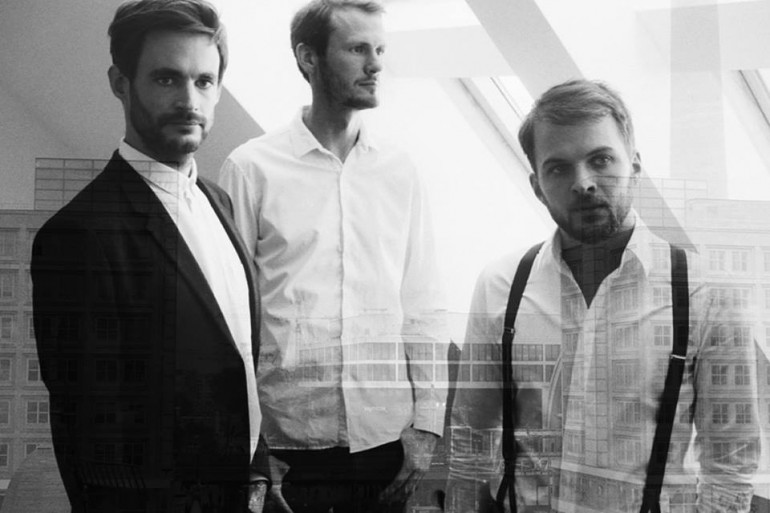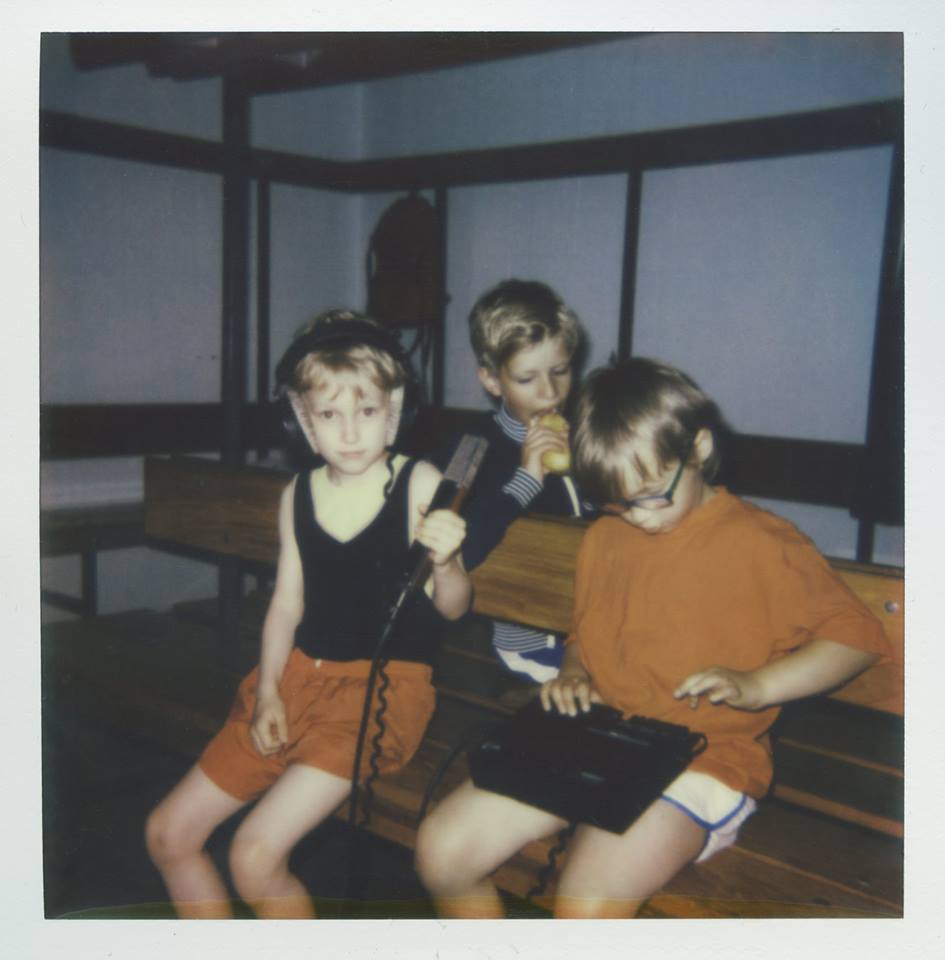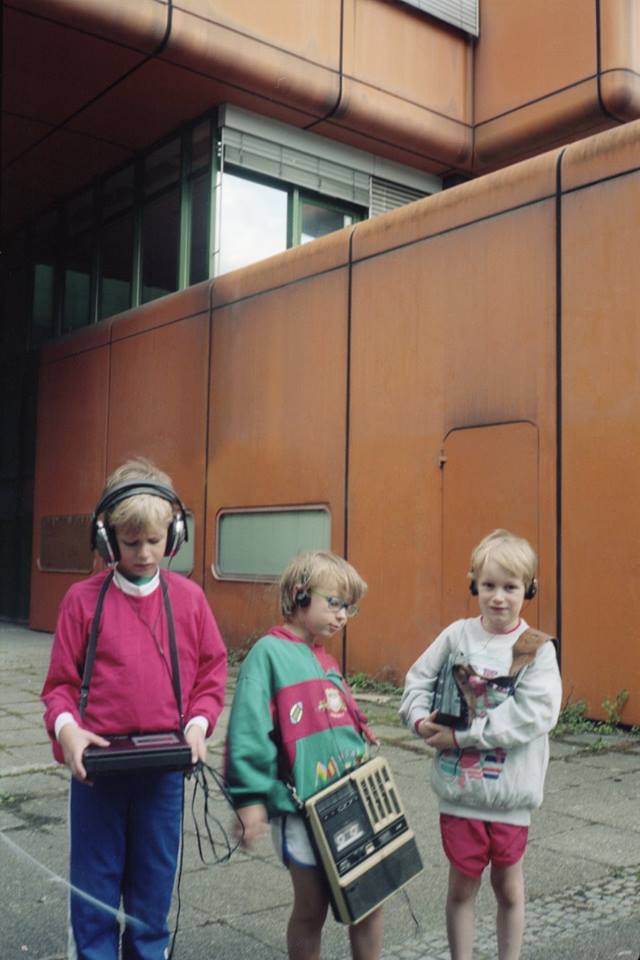Most of the time, the best things in life happen when you don’t expect them to happen. Little accidents or coincidences lead to far-reaching events which have a great impact on your whole future. NONKEEN’s story is a good example for that: it’s full of unplanned moments and unexpected turning points that finally lead to a great outcome.
When the three young boys SEBASTIAN SINGWALD, FREDERIC GMEINER and NILS FRAHM first met during their school-times to make and record music together, they never imagined that, decades later, they would release an album as the trio NONKEEN. But due to various random events and probably a little hint of destiny, their debut record The Gamble will be released in a few days, on February 5. An album full of fateful energy, unplanned coincidences and real friendship.
Even though the three musicians were often separated during the last two decades, they always managed it to stay in contact and meet up to make their music as FREDERIC GMEINER told us in our recent chat with the three likely gentlemen:
‘We always had a rehearsal space together, various ones; maybe five, six or seven over the years. Sometimes only for a couple of months but it was always important for us to have a space where our instruments are and where we can go whenever we would like to play together. These have often been shared spaces, sometimes really cold ones in the winter time. Also the moments or the frequency we met was changing. Sometimes we didn’t meet for half a year when someone was abroad or whatever. Sometimes we met twice a week, so it was more whenever we have time for it.’
He also unveiled that they never really planned to make an album:
‘It was always a hobby thing for us. Basically to hang out together, drink a beer, play music and also not talk that much about the music, just make it. At a certain point we hooked up a simple tape recorder.’
And NILS adds:
‘Capture the songs and sounds and just to see how they sound like. Some recordings were really good we figured and then we had the idea to develop them further and further. Only a couple of months or a year ago we realized thatthis could actually turn into a real album. But it could have failed until the last second. And then we heard the result and were like: oh this is actually much better and much more then what we could have expected from what we know how we would work.
The record itself, according to the acclaimed composer, turns out to be very random. It was all just about playing whatever came to their heads and choose the best bits afterwards. In the end only one percent of the whole recording sessions turned out to be part of the album.
But before they reached the point of wanting to release their recordings on an album, there have been various turning points in their lives. One of them stands universal for all of them: the fantastic story of a dramatic accident during one of their gigs in their teenage years. NONKEEN‘s press-text says that whilst they played a show at Sebastian’s uncle’s funfair at the age of fifteen, suddenly a swing carousel lost it seats and they banged with all its passengers into the stage and the instruments. Due to that event, they decided to put the music on ice and go separate ways. Of course, the story sounds unreal and made up, but what is really behind it?
A prototype accident
Is the story true that at the age of fifteen there has been a dramatic accident during one of your gigs?
Frederic: it’s great that everyone loves the story, we do too. And this accident of course, it sounds very fantastic. It’s more a symbolic thing for a turning point in our friendship.
Nils: Something you can’t really write into an official letter which is addressed to random people. But sometimes the real truth just doesn’t sound right and then you rather live in a dream.
Frederic: We also wanted to make a little bit fun of it. But the basic facts are true somehow. And there is also…
Nils: … some poetry in it.
Frederic: And of course pointing out some accidents that weren’t planned which is a big part of this project and why we are here, the three of us. And why this album exists. It could also relate to accidents that we had to immediately leave the rehearsing space at one point for example and we had to rearrange, but we kept on continuing. Or that we didn’t want to hook up expensive recording gears because we were in so crappy rehearsal spaces most of the time. And there were times where we also couldn’t effort it.
Nils: And there was also a moment where we lost a hard drive. We had to start over in a way. Not completely but we had to go back and redo things. Basically life: full of accidents.
Frederic: The story is more the prototype accident. (laughing)
NONKEEN also listened to all their forgotten recordings, which they gathered on tape since their childhood years.
How was listening to your old recordings for you?
Nils: The stuff we played became somehow distant from us. It was simply too much. We don’t connect to it as we used to do. It’s more like archaeologists who found something. They don’t really know what it is but then they have an obligation to do something with it. I think at least in my case I always tried to have a distance to it. In a similar way as you have a photo in your holiday and you bring the film to the developer two years later and you find all these pictures and you’re: ‘Wow, when was that again? Who took that picture, was it me?’ There was a similar feeling with this tape cassettes. Sometimes they were laying around for years, recorded in the rehearsal room. Lots of time later we would listen to it and we didn’t really know what would be on it. It was almost as we would listen to a private concert from people we don’t know but who addressed it to us. We are the only people who could hear it.
And I think there is kind of this distance between us and the work that gives you also a different perspective on what you are allowed to do with it. The most important advantage is that you are allowed to just throw it away because it doesn’t matter that much. The work flow we chose was basically to take the stress away and let it be like: oh, this is a lucky accident. But whenever we would rehearse or record we would never be like: today I hope that today there is a song that we could use for an album. Please, we need an album (laughing). It was just the opposite, it was kind of like whatever. From so many rehearsals there was nothing interesting in the music or maybe things we would repeat. Sometimes there were musical moments which really surprised us. We couldn’t believe that this was us doing it and we had no idea where the inspiration came from.
Nils Frahm: ‘It was almost as we would listen to a private concert from people we don’t know but who addressed it to us.’
Frederic: And also we didn’t have a concept.
Nils: What fascinates me the most is that we didn’t start with our own specific sound, we started with a Fender Rhodes piano, bass and drums. It sounded like CHICK COREA, or other bands. It also sounded like stuff of the seventies because we used typical instruments from the seventies. The further we went into the album production the more we realized that there are certain moments which are unlike other recordings or music we know. And then in the process making the album we went back to the rehearsal room and were inspired by what we heard. Our improvisations changed because we were inspired by us. It’s kind of a weird feedback which happened all of a sudden, only by listening to our recordings. We tried to get rid of the generic stuff and tried to find concepts how we can create something unique, something that really sounds like us. And this is why I think the idea to listen to your own recordings really helped us defining our own sound.
 Due to all these processes, a truly unique record emerged. On The Gamble NONKEEN managed it to create something new and distinct. Atmospheric, slowly developing electronic elements meet experimental instrumental components and melt into an absorbing mixture. Every song varies from each other and tells its own, hypnotizing story without using any words. And that’s exactly what instrumental music should achieve: constrain the listener without lyrics. There are only the song’s names which can give you a hint what the song is about. Just like the title Chasing God Through Palmyra.
Due to all these processes, a truly unique record emerged. On The Gamble NONKEEN managed it to create something new and distinct. Atmospheric, slowly developing electronic elements meet experimental instrumental components and melt into an absorbing mixture. Every song varies from each other and tells its own, hypnotizing story without using any words. And that’s exactly what instrumental music should achieve: constrain the listener without lyrics. There are only the song’s names which can give you a hint what the song is about. Just like the title Chasing God Through Palmyra.
You’ve got a song with a quite special name on the record: Chasing God Through Palmyra. Why did you choose that title? Is there a political background?
Nils: We talk about politics sometimes but we make instrumental music without lyrics. I think the titles for instrumental music are really interesting ‘cause they change the perception of the music. Probably you heard the song in a slightly different way knowing about the title than somebody who would listen to it not knowing the title. You’re the first one who asks, which we hope somebody might. The song has this chasing quality and it’s video is this train which chases around. The whole thing feels like a chase or somebody following somebody else. It’s so tragic what happened there. We kind of had this sentence because it’s almost like people chased god through Palmyra. It t reflects their extremeness and their religious believes, the city and the culture. The music kind of created that title for us. Palmyra is gone but when we make a song which is remembered then something of Palmyra keeps living in our memory and our culture.
‘We can’t rebuild Palmyra but we can remind people of it.’
Frederic: It’s not exceptionally Palmyra, it’s also the destruction of cultural heritage in general. It’s a tragedy what happened to Palmyra and it’s a symbol or a metaphor. We wanted that the album is not just music but also related to the time we live in and general topics, problems and tragedies that are surrounding all of us.
Nils: There is another song The Saddest Continent On Earth where we talked about this plastic island which exists in the ocean, very far out somewhere. It’s almost the size of Europe, just under the surface of the water there are piles of plastic which are condensed there. I find that title very suggestive because it has this background story but it also could be that people make their own suggestion: what continent are they talking about, is it our continent? I really like this little mystery in it.Of course it’s a question mark. And in the state of wonder in general I believe you activate your gates in your brain and you’re ready to receive something ‘cause you expect something to life as a conclusion. And this state of wonder also in concerts for me is a place where you can plant a seed in people’s hearts and heads. If they’re expecting something in their not-wondering-mode but in der expecting- mind then it’s really hard for people to open up because they’re not irritated. In some way irritation for me is one tool to get people into a state where they receive something.
—



